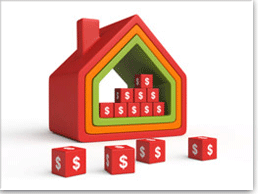How to Find the Real Cost of Monthly Payments
Maybe you’ve run a mortgage calculator to determine the payment on your dream home, and it seems reasonable. But remember, the mortgage payment itself isn’t the actual amount you’ll be paying monthly. Homeowners need to understand the real cost of purchasing their home before they sign the mortgage documents.
There are several other itemized charges that add to your monthly total payment, including local property taxes, private mortgage insurance (PMI), interest, homeowner’s insurance, and homeowner’s association fees. These charges can change over time depending on several factors, which means that your mortgage payment will fluctuate over the life of your loan.
Let’s take a look at what some of these extra expenses are and how they work.
Principal: Don’t suffer sticker shock when you see that you’ve only paid off a tiny fraction of your loan after a year of monthly payments. When you take out a fixed-interest loan for a specified term, your basic monthly payment will stay the same for the life of the loan. However, that payment includes both the amount going to the loan total (or principal) and the interest. At the beginning of the loan the majority of the payment will be going to interest. As time goes on and the principal gets paid down, more of the payment will go toward principal.
Interest: Your basic loan payment will always include both principal and interest, but interest is applied in different ways. The most common loan structures offer either fixed or adjustable interest rates:
- Fixed interest is determined by the lender at the time the loan is made. A fixed interest rate will keep your monthly mortgage payment steady over the life of the loan. If rates drop and you want to take advantage of the lower rates, you have to refinance the loan. However, you are also protected from rates skyrocketing beyond your means.
- Adjustable interest will fluctuate over time generally depending on an index that the loan’s interest rate is tied to. This means that your monthly payment will go up and down and you will have little to no control over when or how much. (Although the rate can only change at the intervals set forth in the loan documents.)
Taxes: You will also pay property taxes (for city, county, state, and school district) in monthly increments through your mortgage payments. A part of each month’s payment goes into an escrow account held by the lender, which then pays the taxes when they become due.
Taxes fluctuate as property values change and as local taxes change. A school bond might be passed, which would increase your total monthly payment. A city might institute a new tax, also increasing the monthly payment. Property owners can use their vote to influence the tax rate, though generally taxes go up over time, not down.
Insurance: The last piece of your payment puzzle is insurance. Two types of insurance are commonly required. Homeowner’s insurance protects the home itself, and mortgage insurance protects the lender from default.
- Lenders require that homeowner’s insurance be carried on properties. Homeowners secure their own property insurance, but it must meet the lender’s requirements. Like taxes, the premium is typically collected in monthly increments and held in an escrow account; the lender pays the premium annually or semi-annually. The amount will fluctuate depending on the insurance policy rates.
- Private mortgage insurance (PMI) mitigates risk for the lender, thus allowing them to approve mortgages for borrowers who desire a loan with a lower down payment. With some loans, homeowners can seek to have PMI removed when they have met specified criteria on their loan, usually involving acquisition of equity and/or paying down the loan to at least 80% of the property’s fair market value.
One additional expense you may have as a home owner is your Home Owner’s Association (HOA) fee. Some homeowners are permitted the convenience of paying their home owner’s association fees through their monthly mortgage payment, also held in an escrow account.
It’s critical to understand all of the elements of your total payment before closing on your house. At Reliance First Capital, we take special care to help our customers determine which loan is right for them, and help them decide how much debt burden they can and should take on based on their real monthly payment. At Reliance First Capital we look at the big picture.
|
 |
 |
|
|
You can trust your
Reliance First Capital
mortgage analyst because they’ve been put through rigorous testing and background checks by the Federal Government, State Governments and by our organization. Also, every one of
our mortgage analysts are registered with the National Mortgage Licensing System (NMLS).
In addition, any information collected by our mortgage analysts are entered into and kept in our secure password-protected proprietary loan origination system, so you can be sure your information is safe.
Finally, you can verify our company by visiting:
HUD: click here
Company Web Site:
Licenses or Testimonials
 |
|
|
|
